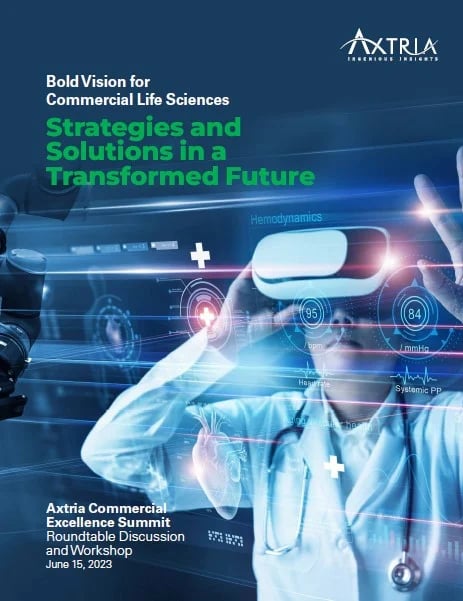Generative AI: Bridging the Gap Between Marketing Agencies and Automated Marketing Email Content
Email marketing in the life sciences industry has evolved as an essential tool for communication and engagement with various stakeholders, including healthcare physicians (HCPs), researchers, and decision-makers within life sciences organizations. Email is a prominent channel for sharing information and promoting life sciences products. Marketing emails serve as a platform for educating stakeholders about new treatments, therapies, medical devices, and scientific breakthroughs. These emails include updates on clinical trials, research findings, product launches, and educational resources. Marketing emails also allow engaging with stakeholders regularly, keeping them informed about the latest developments, fostering trust and loyalty, and ultimately driving brand awareness and preference.
Creating email marketing content requires considering various aspects of promotions in the life sciences industry. One such significant consideration is regulatory compliance. Due to the industry’s highly regulated nature, life sciences companies must adhere to strict regulatory guidelines from organizations such as the Food and Drug Administration (FDA) in the United States and the European Medicines Agency (EMA) in Europe. These regulations govern what can and cannot be communicated in marketing media, ensuring that information is accurate, balanced, and not misleading. Email marketers in the life sciences industry must navigate such regulations cautiously to ensure compliance and mitigate risks.
Other considerations for creating impactful email marketing content include the following:
-
Customer segments: Life sciences companies target a diverse audience. Marketing emails must be tailored to each audience segment, providing relevant and valuable information that addresses their needs, challenges, and interests.
-
Competition differentiation: Marketing emails promote pharmaceutical products and differentiate brands from their competitors. Life sciences companies strive to create compelling emails that highlight their products’ value in corresponding therapy areas and their overall benefits to patient well-being.
The Role of Marketing Agencies in Creating Marketing Email Content
Marketing agencies are essential in facilitating email content for life sciences companies, offering expertise, resources, and specialized skills to help brand marketing teams communicate effectively with their target audience groups. They contribute through strategic planning and aligning email content with broader marketing goals.
Email content is one of the most critical services provided by such agencies. They work closely with life sciences companies to create promotional assets that communicate messages intended for different customer segments – their personalization and segmentation techniques enhance engagement by tailoring content to customer preferences. While working with life sciences companies, marketing agencies also ensure compliance with regulatory bodies such as the FDA and EMA to minimize risks and uphold the company’s reputation. Their creative design teams develop visually appealing email templates optimized for various devices.
Working with marketing agencies can offer numerous benefits, but challenges and potential business problems are associated with the collaboration. Here are some common ones:
-
Cost: Engaging a marketing agency can be expensive. Agencies charge fees for their services, including strategy development, content creation, design, and campaign management. Balancing the costs with the expected return on investment (ROI) can be challenging. In addition, creating personalized options for individual customer segments and multiple options for the same email content can be very expensive in most agency engagement frameworks.
-
Communication and collaboration: Transparent communication and collaboration between the brand marketing teams and the marketing agency are essential for success. However, misalignment of expectations and unclear communication can lead to misunderstandings and delayed timelines. Building a solid working relationship requires ongoing effort and coordination.
-
Flexibility and adaptability: The life sciences experience evolving market trends, regulatory changes, and scientific advancements. Marketing agencies often struggle to demonstrate flexibility and adaptability to respond quickly to changing business needs and market conditions. Companies may encounter challenges if their agency partners are not agile or responsive to changes in the industry landscape.
The Importance of Modular Email Content Creation
Modularization in marketing email content generation involves creating flexible email templates and customizable content components that suit different audience segments, message ideas, and promotional campaign goals. This approach streamlines the email content creation process and enhances efficiency by:
- Developing modular email templates with predefined sections.
- Allowing for versatile layout options.
- Utilizing interchangeable content blocks within modules.
- Allowing marketers to swap out content without affecting design.
- Supporting personalization by dynamically inserting personalized content into predefined blocks.
- Maintaining content libraries with pre-approved assets organized into modular components for easy retrieval and reuse.
- Facilitating A/B testing to identify effective combinations of content and design elements.
- Supporting localization and globalization efforts for companies operating in multiple regions.
- Enhancing scalability and efficiency by streamlining the content creation process.
- Ensuring consistency in branding and messaging across campaigns and touchpoints.
Modularization empowers life sciences companies to create personalized, engaging, and efficient email campaigns that resonate with their audience and drive desired outcomes effectively.
Generative AI – Going Beyond Modularization for Email Content Generation
By 2028, 60% of B2B seller work will be executed through conversational user interfaces via generative AI sales technologies, up from less than 5% in 20231.” – Garter, Inc.
Generative AI (GenAI), driven by sophisticated machine learning (ML) algorithms, represents a significant breakthrough in email marketing by analyzing datasets and generating marketing content. GenAI offers tremendous potential for streamlining content creation processes, refining personalization strategies, and improving customer engagement.
At its core, GenAI enables marketers to harness previously created email content assets to automatically generate a variety of email content drafts that resonate with recipients on a highly personalized level. GenAI can dynamically tailor email content to individual preferences, behaviors, and demographics in real time. This capability enables marketers to deliver cost-effective, timely, relevant, and highly targeted messages, thereby maximizing the impact of email campaigns.
-
Speed: GenAI enables the rapid creation of derivative and additional versions of promotional content by leveraging pre-approved assets created by marketing experts. With ML algorithms, marketers can quickly generate multiple variations of email content using existing templates, imagery, and messaging. This speed allows for efficient content creation without extensive manual intervention.
-
Low-cost modularity: GenAI enables the implementation of modular content at low cost by automating the creation of granular tags, such as subject, header, primary content, call-to-actions, etc. Marketers can leverage modular email templates and content blocks to assemble personalized email messages tailored to individual recipient preferences, effectively reducing production costs and streamlining content creation workflows.
-
Variety: GenAI enables marketers to create numerous options and variations of email content without incurring significant incremental costs. By automating the content creation process, brand marketing teams can generate a wide range of personalized email messages at scale, effectively reaching diverse audience segments without exceeding budgetary constraints.
-
Customization: GenAI enables marketers to fine-tune messaging and imagery to align with each targeted user’s preferences. By analyzing user data and behavioral patterns, ML algorithms can dynamically adjust email content to resonate with individual recipients, ensuring the right message is delivered to the right customer through the right channel at the right time.
-
Regulatory compliance: GenAI provides marketers with an interactive user interface to apply levers to content creation while ensuring compliance with regulatory bodies, such as the FDA and EMA. This interface allows marketers to customize content generation parameters and preferences, such as tone, style, and branding guidelines, while maintaining regulatory compliance and brand consistency.
-
A/B testing: GenAI facilitates continuous testing through A/B and multivariate testing without incurring additional content development costs. Marketers can experiment with different content variations and messaging strategies to optimize email performance over time. This iterative approach to testing allows for ongoing refinement and improvement without the need for extensive manual intervention.
-
Efficient medical, legal, and regulatory (MLR) reviews: GenAI allows pharma marketers to submit a wide variety of content versions into the MLR process as a single submission, which saves time and effort by consolidating multiple content variations into one review cycle, streamlining the approval process, and accelerating time-to-market for email campaigns.
“By 2025, 30% of outbound marketing messages from large organizations will be synthetically generated using generative AI, up from less than 2% in 20222.” – Gartner, Inc.
Axtria, with its team of engineers, data scientists, and domain experts, stands at the forefront of innovation in providing GenAI solutions tailored to the unique needs of life sciences companies. With cutting-edge capabilities in GenAI-based marketing email content generation and exceptional skills and resources, Axtria offers a transformative solution that combines technology with human expertise to drive impactful and scalable marketing email content generation. Schedule a demo today to witness Axtria’s GenAI in action and learn how its capabilities can pivot your email marketing strategy.
References
- Gartner, Inc. Gartner Expects 60% of Seller Work to Be Executed by Generative AI Technologies Within Five Years. September 21, 2023. Accessed May 2, 2024. https://www.gartner.com/en/newsroom/press-releases/2023-09-21-gartner-expects-sixty-percent-of-seller-work-to-be-executed-by-generative-ai-technologies-within-five-years
- Gartner, Inc. How Tech Marketing Teams Are Capitalizing on Generative AI to Improve Content Marketing. Accessed May 2, 2024. https://www.gartner.com/en/doc/785385-how-tech-marketing-teams-are-capitalizing-on-generative-ai-to-improve-content-marketing
Author details

Bilahari Manipuzha
Bilahari has 17 years of expertise in conceiving and constructing data integration and analytics platforms tailored specifically for the life sciences. His unique blend of deep domain knowledge, complemented by his exceptional technical proficiency, has played a pivotal role in aiding global enterprises in the development of cutting-edge analytics solutions.

Suraj Gupta
Suraj Gupta is a Manager, Marketing at Axtria. He has over 9 years of experience in the analytics and consulting industry, with more than 6 years with life sciences. At Axtria, Suraj has contributed to sales and marketing functions, including business and client development, knowledge management, digital marketing, business intelligence, and content writing. Suraj has an MBA degree in Marketing and a graduate degree in Economics.




